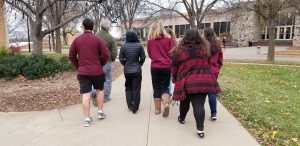Taylor Clemens Finds Balance
Posted in Uncategorized on December 11th, 2018 by RileyTaylor Clemens strolls down the the steps of the Klinger-Neal Theatre. In comparison with his colleagues, Clemens is fairly new. He’s been at Morningside College for two and a half years. As of now, his experience pales compared to that of his predecessor. However, this goes unnoticed. He jaunts down the stairs with rhythm and purpose. He is the professor, and this is his theatre.
He was born in Elkader, Iowa. That’s northeast, just a few miles from the border of Wisconsin. It wasn’t until high school that he found Theatre. “There was a girl that I fancied, that was doing lighting,” Taylor remembers. One afternoon rehearsal, Theatre teacher “burst in to the lighting booth” and demanded he participate in the play. He became the stage manager. Then he was in The Jungle Book. His high school career culminated with the role of Conrad Birdie in Bye Bye Birdie. Then he graduated, and left the hobby behind.
“[Iowa State] has a pretty kickass Software Engineer program,” Taylor remembers about his initial college interests. “But after a couple months I realized it wasn’t something I wanted to do for the rest of my life.” He fell back in to Theatre after taking a Global Film class, which he will be teaching in the Spring of 2019 at Morningside. After his first semester, he realized he wanted to go back to making “kick ass art!”
He graduated Iowa State with two Bachelor’s Degrees, one in Acting and Directing, the other in Theatrical Production. Afterwards, he received his Master’s degree from the University of South Dakota. During his academic career, he got his first job in the industry at the school scene shop. It would spring board his interests beyond that of the acting and directing world. He became entirely infatuated with each aspect of a production.
Taylor Clemens looks exactly like you would expect him too. When we first met, his hair was long. Meeting today in his office, his hair pulls back in to a mini ponytail. He has a full beard that covers his face, with a mustache that seems to narrowly miss going into his mouth. If you were paying attention, you would notice that he has a uniform of a button-up long sleeved shirt, with the sleeves rolled up to the elbow. While most Professors concern themselves with slacks and dress shoes, Clemens wears work pants and work boots; a clear reminder that he is at all times Professor, Director, Scene Carpenter, and lighting designer.
With the knowledge of all these different occupations, Taylor could have made a name for himself in the professional world, but that’s not how his story goes. “This is where I want to be. I have a passion for teaching, and a passion for learning. I love school!” He smirks, “I might not totally be done with school, to be honest.”
“I had a friend that was directing The Glass Menageriehere [at Morningside],” Taylors looks back, “and she said ‘they’re looking for someone that does everything, and that’s you.’” He accepted the job at Morningside after hardly considering two other offers. “Well, I needed a job,” Taylor laughs. “There is something nice about having a steady paycheck. And I wanted to be somewhere that I could be a part of.” And, theoretically there is not much he can’t do at Morningside that the he can’t do in the private sector.
“Here, it’s really nice because I have more freedom than I would in the private sector,” Taylor considers. “In the private world, it’s all about money, where in the academic world, it’s all about the education of the students.” This works out well for Professor Clemens as he has an “odd taste” for plays. He prefers productions that are out of the box, as opposed to standard Broadway shows. “Here I can focus on that. I can find a balance for what will bring people in, and what will be a learning experience for the students. I don’t have to worry about money.” And though that seemed a blessing in 2016, not everything was as it seemed.
We’re meeting in Taylor’s office in Charles City Hall, Morningside’s oldest building. The bookcases are filled with play and musical scripts. It’s slightly darkened, possibly with age. And he sits behind a very large, two sided, desk. If he had a top coat and hat, he would be a very foreboding presence, sitting in his large chair, a sitting chair that has been rigged on to a wheeled platform. His corner office is quite large, one of the largest on campus. Of course, someone in his position, with so much to watch over, needs such a space to work and hold meetings. Though it is in stark contrast to what has happened to the Theatre Department as of late. We both look at each other and laugh. We know where the conversation is headed.
In 2016, budget constraints hit Morningside College. It was made obvious at the beginning of that school year that departments would be cut, and jobs would be lost.
“It was a feeling of ‘Well, I know who’s going first, the new professor straight out of grad school,’” Taylor now jokes. However, for his benefit, and the benefit of the school, that is not how the story would unfold. Betty Skewis-Arnett, the longtime tenured Theatre Department Head at Morningside, decided it was time to retire. With that decision, the school left Taylor Clemens as the sole faculty member to oversee the Theatre, with one catch. The Theatre Department would be cut and the incoming students would be added to the Performing Arts Major.
“It’s not anger,” Taylor reflects, “its more… disappointment. It’s what I’m passionate about.” He still believes that his Theatre program will continue. There will be plenty of students that love Theatre, some will even have a passion for it. What is most unfortunate is that, for the time being, there will not be a student that will be recruited to Morningside where their one and only dream is to be a part of the Theatre industry. “If you take Trifles [Morningside’s Spring 2018 production] you had students and faculty collaborating to make something really great that we can all be proud of. So that is what upsets me the most. That we will lose students with that passion. That this is their sole goal in life.”
Interestingly enough, Morningside President John Reynders has explicitly told Professor Clemens that he loves the Theatre program. When he started, Reynders did tell Taylor that he would like him to push the envelope. The timing, or more appropriately, the person, could not have been better.
“I enjoy darker, weirder, creepier, stuff,” Taylor states. So, when the school President asked him to come up with something edgier, Clemens was more than happy to comply. Combining that with his style of teaching, Taylor Clemens began to change the Theatre program.
Through his classes, he has exposed the the students to more “out of the box” material. Two Student Directors, Brock Bourek and Amy Jackson picked edgier material, Two Roomsand Octopus,respectively. Though, he did not push them in to these projects. They were both ideas that were brought to him. Now, however, is where Clemens has to separate himself from other professors. He must lead them to create a production that is almost entirely their own.
“I feel like these obscure plays have been influential because they teach you how to look at a topic in a different light, ” Two Rooms Student Director Brock Bourek. Two Rooms is a play written in1989, dealing with, the very real issue of terrorism, kidnapping, and love. Brock chose to interpret the play from a political viewpoint, much different from the comedic work done in his previous directorial effort Love Sex and the I.R.S. “I think it’s important to learn a different lesson from all types of Theatre. [Taylor] has taught me how to look at these things from a different perspective, and I think I’ve become a more well rounded person … a Jack of all Trades.”
“It comes down to what I feel the student needs,” Clemens explains. “They need to learn that there are consequences, and deadlines, and no one’s going to be there to hold their hand. Though they know they can always call me if they need me.” This philosophy of his pushes beyond that of the normal teacher. Clemens is getting his students ready for the real world.
“I would say his best quality is how much he wants his students to succeed,” explains Morningside Theatre Major Annalee Dorsey. “But what can irritate me most about him is how hard he is on me. That’s because he knows I can do well in my future career.” Dorsey is a Senior Theatre major, and one of the few passionate students that have found the industry to be what they really want to do in life. Clemens is somewhat of a “jack of all trades” himself. He understands every aspect of the stage, such is the job of the Stage Manager, this is where his passion began. Now, more often than not, Annalee is the stage manager for the Morningside productions. Many students will tell you that she “runs a pretty tight ship.” This is an active example of learning from a man whom she has called “a great mentor.”
“I can tell you that, Brock, was trying to emulate my directing style in Love, Sex, and the IRS,” Clemens reflects, “however, in Two Roomshe had adapted into his own style and it became a better Directorial effort.” When he says this, one must take note that Brock Bourek is one of the few truly passionate members of the Theatre program. They must remember, that this is the first time in his career as a teacher that Taylor Clemens is actively seeing his impact, and his style, emulated in one of his pupils.
“He was there to help me through ‘Love, Sex’,” Brock remembers. Brock Bourek is a Senior Theatre and Art Administration double major. Clemens began at Morningside in Brock’s Sophomore year. From the time betweenthe two plays, Clemens helped him “grow as a performer and as a Director.” By the time his Senior year came along, Brock was directing a deliberately deeper adaptation of Two Rooms, and what he had learned did not pass him by. “I feel like Two Rooms was my best accomplishment as a director.
Though both Brock and Annalee have grown exponentially in their respective fields under Clemens’ direction, not everything can be pleasant.
“I’m not here to be anybody’s friend,” Clemens states. “I’m here to teach you. And sometimes I need to be an asshole for that to happen.” There have been times over the past years where both Annalee and Brock have been at odds with their mentor. However, Clemens recognizes this as an inevitable of the profession. “There are going to be days where a student that I know likes me, is going to hate me. There is more than just the ‘professor/class’ attitude. There are a lot of emotions that go in to a show.”
Many times during our conversation, Taylor has mentioned, or alluded to the word “balance,” something he is still trying to find as a professor in his first full time teaching job. His biggest balance is finding his line between professor, mentor, and friend. At first, he laughs at the question, but as he falls deeper into thought, there is a long silence. “I think it is a blurry line between all of those,” he begins. “I’m still trying to figure that line out as a young professor, but it’s hard to classify the Production world by the black-and-white teacher relationship. But, I love all my students equally.” He smiles, “sometimes I don’t think I’ll ever need kids!”
“He is all three [professor, mentor, and friend] to me,” reflects Annalee. “He has been there to guide me through my academic career, as well as some troubles in my own life. Similarly, Brock believes this to true of Taylor, “One of his best qualities is that he will always sit and listen to what you have to say, along with giving advice on career/life choices. I believe after I graduate, he and I will remain good friends.” As I sit putting these words together, Taylor is being approached by Brock. Brock’s friend, a fellow Theatre mainstay, is in trouble; possibly just unhappy. Without a second thought, Taylor jumps in to reach out and save the day – care for his students – as he has done so many times before.
When it all boils down to who Taylor Clemens really is, he is a Director. If he weren’t in the academic world, that is what he would be doing. He enjoys the collaboration, and he loves the innovation. In a way, he does that beyond the scope of productions. During Two Roomswe called him “The Wizard,” in reference to The Wizard of Oz. He fixes problems that we are having, and helps avoid issues we had yet to see. In a way we are all his actors. He’s the man with all the answers, though in his own right, he is learning alongside us, much like a Director is the leader of his cast. And, much like a director strives to find the balance between comedy, drama, action, and romance, Taylor Clemens is finding his balance as a teacher. Though he happily lives as a Professor, a Mentor, and a Friend.



